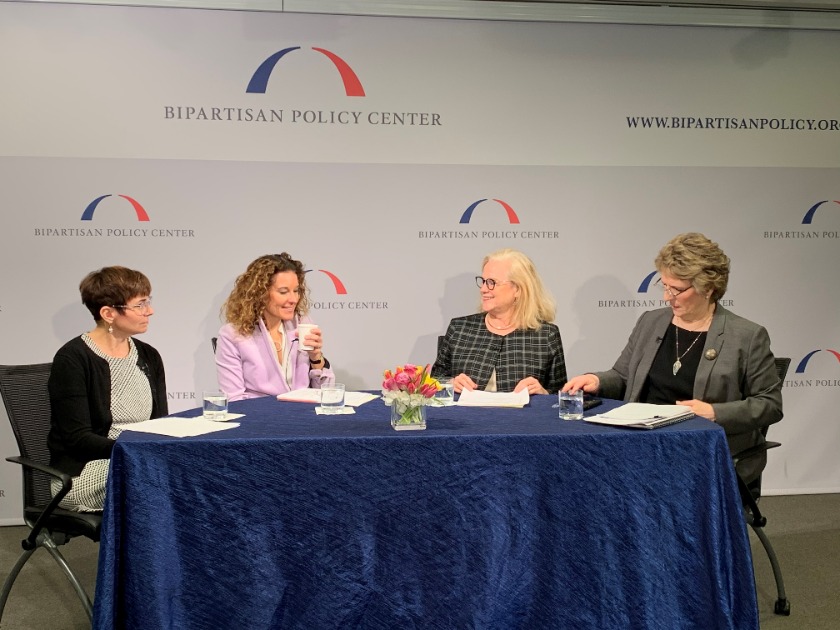BPC Event Highlights the Potential for Apprenticeships to Build the Early Childhood Workforce

This week, the Bipartisan Policy Center (BPC) held an event discussing how registered apprenticeships can play a role in moving forward the skills and compensation of the early childhood workforce. The first panel provided an overview of the apprenticeship landscape. BPC’s Director of the Early Childhood Initiative, Linda Smith, began the conversation by citing a Bureau of Labor Statistics estimate that 180,000 child care jobs are expected to open each year over the next decade as the demand in the field grows. To fill this need, states are increasingly turning to ECE apprenticeships; 16 states currently have local or statewide ECE registered apprenticeship programs.
Shannon Christian, Director, Office of Child Care, spoke about how ECE apprenticeships give existing providers opportunities to increase their level of knowledge in a way that breaks down common barriers to seeking further education and will allow them to earn higher wages. Director Christian noted that cultivating the provider workforce was a frequent topic during recent efforts to gather input on expanding access to affordable, high-quality child care, including a request for comment and a 10-city listening tour. Stakeholders called for a professional development system that meets providers where they are and helps make pursuit of a credential or degree more affordable. ECE apprenticeships were often discussed as an innovative and feasible approach to meet these needs.
FFYF’s Executive Director, Sarah Rittling, emphasized the value in building from what’s already happening on the ground, learning what is needed, and equipping states with the requisite tools. Additionally, successful state and local ECE apprenticeship programs can be a model for other states. Building on Director Christian’s explanation of possible funding opportunities, which include quality investments required by the Child Care and Development Block Grant Act and technical assistance dollars, she agreed consideration of existing funding streams is useful, but additional funding is needed to expand beyond what states and localities are already doing.
Michelle Figlar, Vice President of Learning for the Heinz Endowments, highlighted the role of philanthropy in addressing workforce shortages. Ms. Figlar shared that where investments previously had been siloed between providers, higher education, and workforce, apprenticeships now offer the opportunity for all players to have a seat at the table, including the incumbent workforce, whose experience and expertise has not always been acknowledged. She also spoke to how apprenticeships can break down barriers to continuing education, noting that many providers have begun coursework but not completed a credential or degree. Further, the continuum should be such that a professional can enter at any point (and decide where to stop) with bridges to easily move from one step to the next.
The second panel featured representatives of apprenticeship programs in West Virginia, which has had a program in place since 1989, and Pennsylvania, which has seen considerable progress from a single pilot into a statewide system in a short amount of time. Cheryl Feldman, the executive director of Pennsylvania’s District 1199C Training & Upgrading Fund, outlined how its system operates and is funded through a blend of philanthropic, state, and federal dollars. The program evolved from the recognition that child care providers didn’t have access to the same types of career pathways as health care workers. With that in mind, they developed an apprenticeship program that offers the child care workforce a pathway to a bachelor’s degree if they choose.
Jameelah Jones, a former apprentice and assistant teacher at the Parent Infant Center in West Philadelphia, shared about the impact of her apprenticeship experience in helping her to complete an associate’s degree after 20 years in ECE: “It helped to speed me along. I saw an actual goal in sight; … having the support of mentors and from Cheryl, the 1199C foundation, and my employer; being able to complete the competencies; and taking the information I learned in class and apply what I learned in my classroom. Now I’m working toward a bachelor’s in early childhood.”
Jennifer Conkle, Apprenticeship for Child Development Specialist (ACDS) Statewide Coordinator for River Valley Child Development Services in West Virginia spoke about how their program evolved with some trial and error over the program’s 30-year history. Jennifer credited community buy-in when asked about sustained interest and engagement in the program. “The community saw … it was making a difference for everyone involved. Students were learning, taking the information, and were eager to go back and apply that in the classroom. … And their employers saw … a difference in the classroom. At the state level, when licensing would go in and evaluate the programs, they saw … the quality in a program where someone has taken the apprenticeship program versus the quality in a program where someone hasn’t–it’s an obvious difference.”
Paula Stewart, a former apprentice, shared her experience of completing an apprenticeship while working as a family child care provider and explained that it showed her she was already doing a lot of things right and made it easier to implement what needed to be done and to expand on those things. Having completed her apprenticeship in 1999, she now serves as an infant toddler specialist at Link Child Care Resource and Referral where she teaches a class that can be used to satisfy the first semester of the ACDS program. Jennifer and Paula spoke at length about West Virginia’s efforts to make the apprenticeship program seamless for students, including a statewide curriculum that is aligned with state licensing regulations and infant, toddler, preschool, and school-age student standards and articulation agreements with 14 higher education institutions.
Looking ahead, BPC prepared a discussion guide to facilitate ongoing community conversations. That discussion guide, as well as the full video of the event and links to other resources can be found here. FFYF is also working to advance ECE apprenticeships at the federal level. Our resource is available here, and we will continue to share resources and updates as they become available.
Subscribe to FFYF First Look
Every morning, FFYF reports on the latest child care & early learning news from across the country. Subscribe and take 5 minutes to know what's happening in early childhood education.


